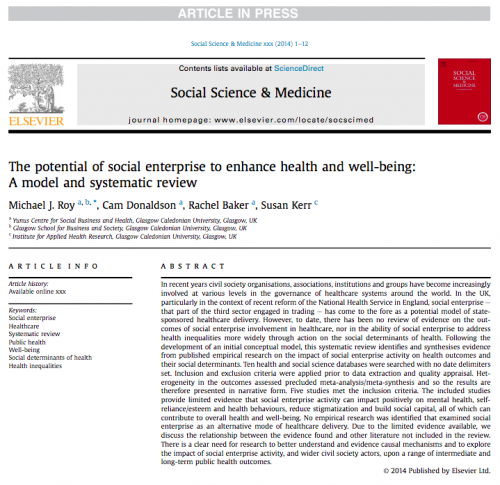Highlights
- Identifies/synthesises social enterprise activity on health and well-being.
- Presents a potential conceptual model to aid understanding of pathways to impact.
- Positive evidence presented upon a range of psycho-social outcomes and determinants.
- No empirical research found examining SE as a mode of healthcare delivery.
- More research is required to better understand and evidence causal mechanisms.
Abstract
In recent years civil society organisations, associations, institutions and groups have become increasingly involved at various levels in the governance of healthcare systems around the world. In the UK, particularly in the context of recent reform of the National Health Service in England, social enterprise – that part of the third sector engaged in trading – has come to the fore as a potential model of state-sponsored healthcare delivery. However, to date, there has been no review of evidence on the outcomes of social enterprise involvement in healthcare, nor in the ability of social enterprise to address health inequalities more widely through action on the social determinants of health.
Following the development of an initial conceptual model, this systematic review identifies and synthesises evidence from published empirical research on the impact of social enterprise activity on health outcomes and their social determinants. Ten health and social science databases were searched with no date delimiters set. Inclusion and exclusion criteria were applied prior to data extraction and quality appraisal. Heterogeneity in the outcomes assessed precluded meta-analysis/meta-synthesis and so the results are therefore presented in narrative form. Five studies met the inclusion criteria.
The included studies provide limited evidence that social enterprise activity can impact positively on mental health, self-reliance/esteem and health behaviours, reduce stigmatization and build social capital, all of which can contribute to overall health and well-being. No empirical research was identified that examined social enterprise as an alternative mode of healthcare delivery. Due to the limited evidence available, we discuss the relationship between the evidence found and other literature not included in the review.
There is a clear need for research to better understand and evidence causal mechanisms and to explore the impact of social enterprise activity, and wider civil society actors, upon a range of intermediate and long-term public health outcomes.





